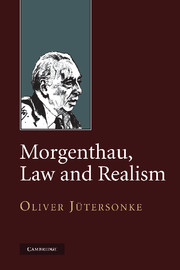Book contents
- Frontmatter
- Contents
- Preface
- Acknowledgements
- Note on the text
- 1 Hans J. Morgenthau in International Relations
- 2 The justiciability of disputes
- 3 Hans Kelsen and the reality of norms
- 4 Legal realism and behaviouralist social science
- 5 Legalism, romanticism and irresponsible statecraft
- 6 The legacy of legal formalism
- Name index
- Subject index
- References
2 - The justiciability of disputes
Published online by Cambridge University Press: 17 November 2010
- Frontmatter
- Contents
- Preface
- Acknowledgements
- Note on the text
- 1 Hans J. Morgenthau in International Relations
- 2 The justiciability of disputes
- 3 Hans Kelsen and the reality of norms
- 4 Legal realism and behaviouralist social science
- 5 Legalism, romanticism and irresponsible statecraft
- 6 The legacy of legal formalism
- Name index
- Subject index
- References
Summary
This and the following chapter will begin to sketch out the academic debates that Morgenthau's early European publications and manuscripts were feeding into. While these works were in the field of international law, our reading will require a number of short detours into the history of German public law. Late nineteenth-century and early twentieth-century public law debates, usually running under the labels of allgemeine Staatslehre (general theory of the state) and Staatsrechtslehre (legal theory of the state), were steeped in historical-philosophical analysis that did not yet make the clear distinction between domestic/constitutional and international law that is made today. Instead, the prevalent distinction was one between private/civil law and public law. Moreover, the nature of the academic training of the legal scholars involved in these fields meant that the resulting debates had a deep, philosophical spin to them that their French and Anglo-Saxon counterparts did not.1 As Martti Koskenniemi writes, the history of international law in Germany during the period since 1871 ‘is a narrative about philosophy as the founding discipline for reflecting about statehood and what lies beyond. In this narrative “concrete reality” sometimes appears as State power, sometimes as the power of a cosmopolitan history – and “social ideals” sometimes intensively romantic-national, sometimes liberal-individualist. This debate came to an end by the Second World War’.2 Of course, no claim will be made to provide a comprehensive outline of these discourses.
- Type
- Chapter
- Information
- Morgenthau, Law and Realism , pp. 37 - 74Publisher: Cambridge University PressPrint publication year: 2010



